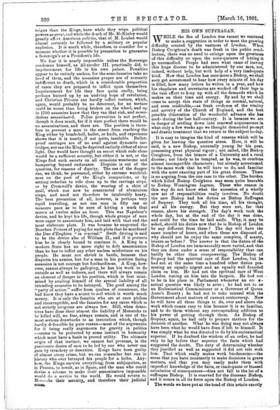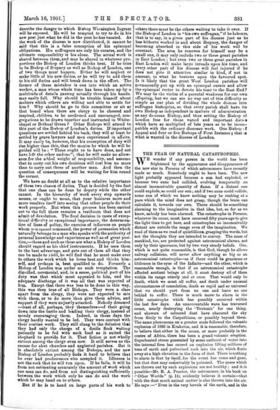HIS OWN SUFFRAGAN.
WHILE the See of London was vacant we ventured to make a suggestion in order to meet the growing difficulty created by the vastness of Landon. When Bishop Creighton's death was fresh in the public recol- lection, there was no need to enlarge upon the greatness of this difficulty or upon the consequences of letting it go unremedied. People had seen what came of leaving this huge diocese to be administered by one man, not, indeed, without help, but with help of a very inadequate kind. Now that London has once more a Bishop, we shall soon get accustomed to hear how every minute of his day is filled, how many letters he writes in a year, and how his chaplains and secretaries are worked off their legs in the vain effort to keep up with all the demands whirl] he makes on their time and energy. By and by we shall come to accept this state of things as normal, natural, and even creditable,—as fresh evidence of the vitality and activity of the Church of England, and the best
possible illustration of the wonderful advance she has ma& during the last half-century. It is because we are in danger of settling down into renewed acquiescence in what only a few weeks ago we thought demanded prompt and drastic treatment that we return to the subject to-day.
• It is easy to imagine the kind of reasons which will be given for leaving the question alone. Here, it will be said, is a new Bishop, unusually young for his post, possessing great physical vigour ; not called, like Bishop Creighton, from the leisure of a University and a rural diocese ; not likely to be tempted, as he was, to combine almost incompatible characters ; but already accustomed to the same work that he will have to do, and familiar with the most exacting part of his great diocese. There is no arguing from the one case to the other. The burden which killed Bishop Creighton may seem quite bearable to Bishop Winnington Ingram. Those who reason in this way do not know what the accession of a wholly new set of responsibilities really involves. No doubt the new Bishop had his duties as Bishop Suffragan of Stepney. They took all his time, all his thought, and all his energy. But they were not, for that reason, above his strength. The day's work took the whole day, but at the end of the day it was done, and could for the time be laid aside. Why, it may be asked, should his duties now that he is Bishop of London be any different from these ? The day will have the same number of hours, and when these are disposed of, why should not he enjoy the same complete if scanty, leisure as before ? The answer is that the duties of the Bishop of London are immeasurably more varied, and that they are done under a sense of responsibility that can hardly be other than overpowering. The Bishop of Stepney had the spiritual care of East London, but he had not at the same time a hundred other duties pos- sessing an equally urgent and an equally well founded claim on him. He had not the spiritual care of West London resting on him into the bargain. He had not • to be in his place in Parliament whenever an ece at- astical question was likely to arise ; ho had not to De an Ecclesiastical Commissioner or a Governor of Queen Anne's Bounty ; he had not to take counsel with the Government about matters of current controversy. Now he will have all these things to do, over and above the work which comes easy to him because it is so familiar, and to do them without any corresponding addition to his power of getting through them. As Bishop of Stepney, again, he had only to prepare matters for the decision of another. What he was doing may not always have been what he would have done if left to himself. It was simply what he was directed to do by his ecclesiastical superior. If he doubted the wisdom of an order, he had only to lay before that superior the facts which had suggested the doubt. The duty of determining whether they justified as well as suggested it did not reit with him. That which really makes work burdensome—the sense that you have constantly to make decisions in grave matters, and that you may easily make them with imperfect knowledge of the facts, or inadequate or biassed calculation of consequences—does not fall to the lot of a suffragan Bishop. It is reserved for the diocesan Bishop, and it comes in all its force upon the Bishop of London.
The words we have put at the head of this article exactly
describe the danger to which Bishop Witinington Ingram will be exposed. He will be tempted to try to do in his new post just what he did in the post he has vacated. As the work of the diocese is now distributed, it cannot be said that this is a false conception of his episcopal obligations. His suffragans are only his curates, and the ultimate responsibility is his alone. The actual work is shared between them, and may be shared in whatever pro- portions the Bishop of Loudon thinks best. If he tries to be Bishop of Stepney as well as Bishop of London, one of two things must happen. Either he will neglect or make little of his new duties, or he will try to add them to his old duties and will break down in the effort. The former of these mistakes is one into which an active worker, a man whose whole time has been taken up by a multitude of details passing actually through his hands. may easily fall. Why should he trouble himself about matters which others are willing and able to settle for him ? Why should he go to this committee or sit at that board when there are clergy to be cheered and inspired, children to be confirmed and encouraged, con- gregations to be drawn together and instructed in White- chapel or Bethnal Green ? Other Bishops will attend to this part of the Bishop of London's duties. If important questions are settled behind his back, they will at least be settled by grave lawyers and men experienced in affairs. It may easily be, however, that his conception of duty will rise higher than this, that the maxim by which he will be guided will be : "These ought ye to have done, and not have left the other undone"; that he will make no allow- ance for the added weight of responsibility, and assume that to carry out his own decisions will cost him no more than to carry out those of another man. And then the question of consequences will be waiting for him round the corner.
We have no doubt at all as to the relative importance of these two classes of duties. That is decided by the fact that one class can be done by deputy while the other cannot. In the hierarchy of work every step upwards means, or ought to mean, tbat your business more and more resolves itself into seeing that other people do their work properly. But when this process has been carried out to the full there remains a residuum that does not admit of devolution. The final decision in cases of excep- tional difficulty or exceptional importance, the determina- tion of lines of policy, the exercise of influence on people whom you cannot command, the power of persuasion which naturally belongs to a man who speaks with the authority of personal knowledge and experience as well as of great posi- tion,—these and such as these are what. a Bishop of London should regard as his chief instruments. If he uses them to the best advantage, and gets out of them all that they can be made to yield, be will find that he must make over to others the work which he loves best and thinks him- self, and perhaps is, beet qualified to do. Formerly a Bishop of London was tinder no such temptation. The dignified, ceremonial, and, in a sense, political part of his duty was that which most appealed to him, and the adequate discharge of it was all that was expected of him. Except that there was less to be done in this way, this was then true of all Bishops. They were a class apart from the clergy, they were not expected to mix with them, or to do more than give them advice, and support if they were unjustly attacked. Nobody dreamed —least of all, perhaps, they themselves—of their going down into the battle and leading their clergy, instead of merely encouraging them. Indeed, in those days the clergy hardly wanted to be led. They were content with their routine work. They still clung to the delusion that they had only the charge of a docile flock waiting patiently to be fed with such food as it suited the shepherd to provide for it. That fiction is not wholly extinct among the clergy even now. It still serves as the excuse for shut churches and neglected parishes. But it is absolutely extinct among the Bishops, and the new Bishop of London probably finds it hard to believe that be ever had predecessors who accepted it. Idleness is not the rock that he will run upon. If he fails, it will be from not estimating accurately the amount of work which one man can do, and from not distinguishing sufficiently between the work which only he can do and the work Which he may hand on to others.
But if he is to hand on largo parts of his work to others there must be the others waiting to take it over. If the Bishop of London is 'this own suffragan," if he labours, that is to say, in a given part of his diocese just as he has hitherto worked in and about Stepney,•the danger of becoming absorbed in this side of his work will be
constant. The area he reserves, for himself way be a small one, it may only include two or three great parishes in East London ; but even two or three great parishes in East London will make large inroads upon his time, and every other part of his diocese will feel injured if he does not give it attention similar in kind, if not in amount, to what be bestows upon the favoured spot. Is it likely that the great West London parishes will permanently put up with an episcopal curate and allow the episcopal rector to devote his time to the East End ? We may be the victim of a parental weakness for our own offspring, but we can see no way out of this difficulty so
simple as our plan of dividing the whole diocese into suffragan bishoprics, so that every parish shall have its own Bishop as independent in matters of administration as any diocesan Bishop, and thus setting the Bishop of London free for those varied and important dutii which have so multiplied of late years as to be incom- patible with the ordinary diocesan work. One Bishop f Appeal and four or five Bishops of First Instance ; that is what is wanted in the diocese of London.







































 Previous page
Previous page